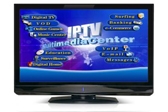
In contrast to the traditional ‘watch whatever’s on’ style of television, IPTV now allows you to choose what you’d like to watch, whenever you’d like to watch it.

What is IPTV?
The service works by converting a television signal into computer data, so channels are encoded in IP format and streamed to the television through a set top box or some other type of device that acts as a decoder.
What is Video on Demand (VoD)?
Video on Demand (VoD) allows users to select and watch/listen to video or audio content on demand. It goes hand in hand with IPTV in that you can watch digital television over the internet, but VoD has that ‘demand’ factor to it, letting you watch a program whenever it suits you. Some examples of video on demand services include Apple TV and Telstra T-Box.
Streaming media content is delivered either as IPTV, or VoD.
What are the differences between IPTV/VoD and conventional TV?
In a word: control. IPTV, being based on a two-way protocol, gives the user greater interactivity with the medium and the content. The provider can better meet the wishes of the user, who has influence over the programs and timing. IPTV is the engine that will drive the new era of interactive content. The success or failure of operators – free and pay – will depend on them being ahead of the game with the new technologies, content formats and business models IPTV ushers in.
The ‘trick play’ functions of pause, rewind and fast forward that we find on DVRs are available using IPTV. This does not allow us to change the content, only how we control the viewing and when we view it. At the next level, IPTV features also allow you to ‘touch’ the program content, perhaps by ordering a product being advertised or voting on a reality TV show via your remote control. In its most sophisticated form, IPTV will immerse you in the program – the content itself being changed by viewer input.
Converged services and other features
The most exciting advantage of IPTV is in converged services. Many of us have a smart phone, such as Apple’s iPhone, which enables us to make calls, synchronise contacts and calendars, and use email. Converged services on television enable us to watch programs, read email, answer the phone, check local weather, look at fuel prices, order food, browse the Internet, or plan a trip and then download it to a GPS device. Convergence for television also means we have more variety of content, which can be from YouTube, RooMedia, ABC online, NineMSN – or any of the multitudes of online sources that provide short-play videos.
Another simpler advantage of IPTV is reliability. Because IPTV streams are delivered over the internet, they aren’t dependent on the weather like terrestrial TV (i.e. digital or analogue TV). Of course, if you have an unreliable internet connection you may have problems.
IPTV also provides additional features, and can easily allow interactive viewing or scheduled recording to take place. Because the delivery doesn’t depend on a license to broadcast using radio frequencies, IPTV also provides access to a far greater diversity of channels and programming.
|
Advantages
|
Disadvantages
|





